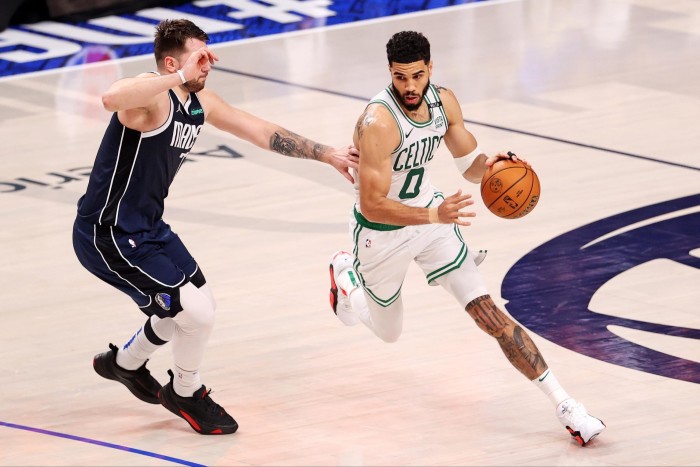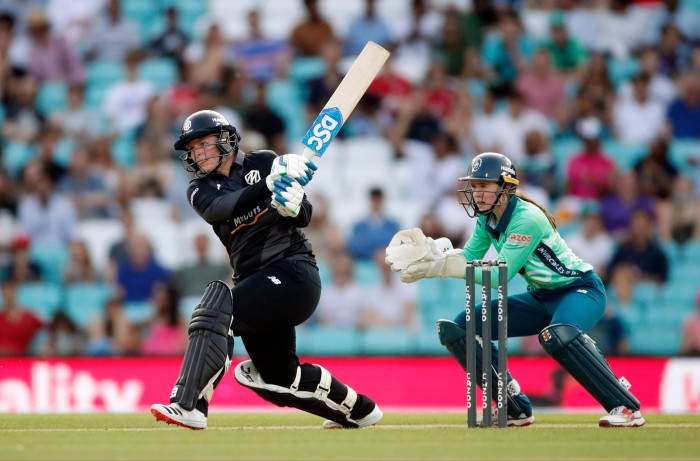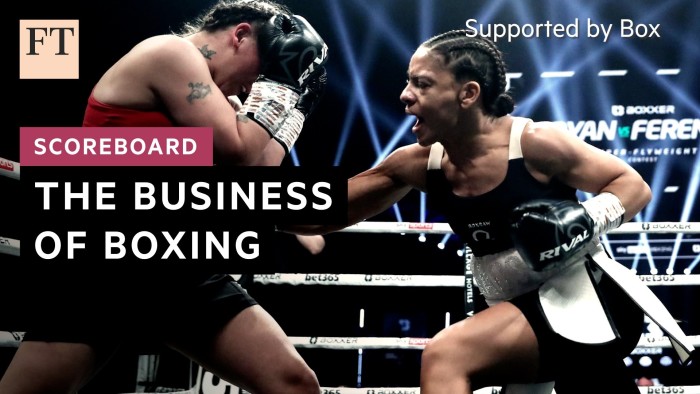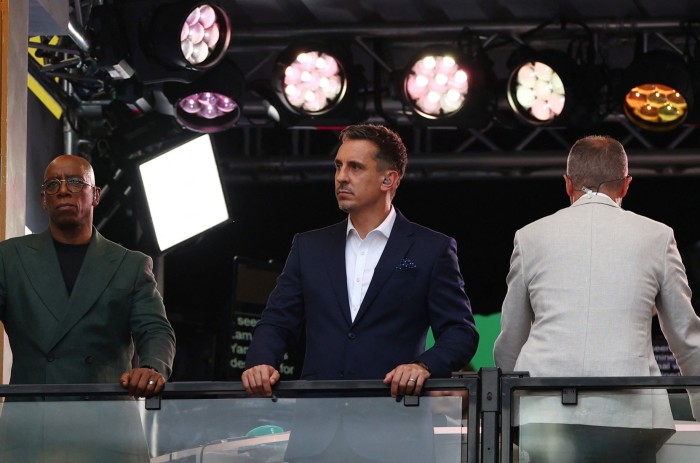
This article is an online version of our Scoreboard newsletter. Premium subscribers can sign up here to get the newsletter delievered every Saturday. Standard subscribers can upgrade to Premium here, or explore all FT newsletters
Good morning from New York, where I am taking care of a last few domestic matters (ie going to see “Twisters” in theatres) before heading to Paris this week for what will be an exciting fortnight at the Olympics.
Scoreboard will be there in full force, with assistance from our chic and savvy colleagues in the FT Paris bureau and beyond. Stay tuned for our comprehensive coverage which begins in earnest this weekend, with this dispatch from inside the (first and possibly last) breakdancing qualifiers, Simon Kuper on why athlete activism should be welcomed, and a profile of Paris mayor Anne Hidalgo.
For athletes and sponsors making the trek to the Games, Thursday marked an important milestone: the beginning of Rule 40 blackout period for marketing. The International Olympic Committee fiercely protects the rights of its top sponsors and the sponsors of its national committees, and as such imposes restrictions on what participating athletes and their individual endorsements can post on social media.
With some exceptions, Rule 40 means that, from now until August 13, companies that sponsor individual athletes but not a governing body or Olympic committee can’t post content using words like “Olympics” or “Paris 2024”. Athletes can’t mention their sponsors on social media either, unless they also sponsor the IOC.
But for brands who do want that Olympic exposure, like LVMH’s Fenty Beauty, that means paying upwards of $100mn to more than $1bn for exclusivity. There’s more on what the world’s biggest luxury good company is doing around the Olympics in FT Weekend.
We’ll be on the lookout for all the creative marketing around the Games, and in the meantime we have dispatches on crunch time for NBA media rights, and a look at The Hundred, the English cricket experiment that is about to undergo a revolution. Do read on — Sara Germano, US sports business correspondent
Send us tips and feedback at [email protected]. Not already receiving the email newsletter? Sign up here. For everyone else, let’s go.

Are the NBA and Warner Brothers Discovery headed for a fight?
The US National Basketball Association has been inching towards finalising its next round of domestic broadcast rights partnerships, and this week notched an important step: team owners voted to approve proposals from Disney, Amazon Prime Video and Comcast’s NBC, worth roughly $75bn over eleven years.
The catch? The jury is still out at Warner Brothers Discovery, one of the league’s incumbent partners, whose TNT network has carried pro basketball dating back to the 1980s. In its current contract, WBD has matching rights to any third-party proposal — in this case, only Amazon or Comcast, since Disney is also an incumbent — and is currently reviewing those proposals, a TNT spokesperson confirmed to Scoreboard.
Sources tell Scoreboard that Monday will be the tentative deadline for any response by WBD. What remains unclear is each party’s definition of what constitutes a “match” of a current proposal, and whether the evaluating metrics are dollar amounts (the Amazon proposal averages about $1.8bn per year, while Comcast’s is roughly $2.5bn), reach of their respective platforms, or other variables.
At a press conference on Tuesday night, NBA Commissioner Adam Silver said the league weighed several criteria when selecting its next media partners, for contracts that will take effect beginning with the 2025-2026 season. Those included a mix of linear and streaming coverage, as well as “partners that had resources to promote the game . . . there are other critical terms that are important to us to make us more fan-friendly”.
WBD, meanwhile, is in the midst of weighing a potential split of its studio and streaming businesses, as the FT exclusively reported on Thursday, in part to manage its current $39bn net debt load. Those considerations, whether or not they materialise, are separate from the NBA rights negotiations.
Nonetheless, the value of the NBA rights — which will be at least $75bn, regardless of whether WBD matches — stands in stark contrast to the scene in Europe, where football rights have been heading downwards. No wonder the US is still seen by many as the only safe place in sport to park serious investment cash.
The Hundred seeks a global audience (of investors)

The Hundred gets under way on Tuesday next week in London, where the Oval Invincibles take on the Birmingham Phoenix. English cricket’s answer to the Indian Premier League — a showy, short-form competition with jazzy names and big stars — is about to undergo a major revamp behind the scenes.
The England and Wales Cricket Board, which launched The Hundred in 2021, is seeking to bring in investors to each of the contest’s eight franchises. The ECB, which currently owns all the teams, will transfer a 51 per cent stake of each franchise to its host county. The ECB will then sell its 49 per cent to outside investors, along with any amount that the host county wishes to offload. A country could, in theory, opt to sell 100 per cent of its franchise, although that is not expected to happen.
A centralised process of identifying investors, handled by merchant bank Raine (who else), is set to begin in earnest in September, with the aim of having a range of deep-pocketed backers in place before The Hundred starts up again next summer.
People involved in the talks have been fielding calls already from a broad range of potential new shareholders, likely to include owners of IPL franchises, private equity firms and sports specialist investors. They could also be paired up in order to maximise the influx of expertise, which the ECB thinks will unlock the next level of growth.
The hope is that cash generated from selling stakes in the teams (which will be shared with counties that don’t host a franchise) can be used to flood English cricket with some much needed money. Paying off debts, improving infrastructure and generally getting the domestic game back on an even keel are among the objectives. Cash will also go to the recreational game.
The Hundred was set up partly with the long term goal of using it to raise cash in mind. But the formula is aimed at bringing in a new type of cricket fan. Matches are arranged as double headers — with the women’s teams starting first at a family friendly hour, with the men’s teams coming on in the early evening.
Figures from the ECB show the results. Last year, 580,000 tickets were sold for The Hundred matches, of which 41 per cent went to families, and 30 per cent to women. The format has also given a major boost to women’s cricket, allowing the ECB to increase top salaries for female players from £15,000 in 2021 to £50,000 now.
The investment push is an important moment for English cricket, and for the global game. Pretenders to the IPL crown have proliferated, and it’s hard to see a future in which they all survive. By bringing in wealthy professional backers, the ECB hopes to make sure the The Hundred is the one that thrives in its timezone, potentially paving the way for a global calendar that moves from Australia to India to England (and then perhaps finishing in the US).
The pitch seems pretty straightforward. Teams in closed leagues with young fanbases are hard to come by, and cricket appears to have plenty of room for growth. But the key, as always, will be price, and whether the ECB can get enough money for its new prized asset to make the stake sales worthwhile.
Highlights

-
Top heavyweights Tyson Fury and Oleksandr Usyk are among the best paid athletes in the world. But what is life like for professionals further down the ladder? In the latest Scoreboard video, we look at how fighters have to battle inside and outside the ring to make a living.
-
Disney CEO Bob Iger and his wife Willow Bay have agreed to buy a controlling stake in the US National Women’s Soccer League club Angel City FC at a valuation of $250mn, making it the most valuable women’s sports team in the world.
-
Gareth Southgate stepped earlier this week after eight years in charge of the England football team. Reaching two finals in three years has sparked much debate about his record — so the FT’s John Burn-Murdoch has looked at the numbers to answer the key question: was he great, or was he lucky?
-
French football clubs have agreed a last minute broadcast deal with streamer DAZN and Qatar-owned BeIN, staving off a brewing financial crunch but locking in a sum far lower than hoped.
Transfer Market

Former Manchester United defender Gary Neville has become the latest signing for Creative Artists Agency, the Los Angeles-based talent agency. Neville joins a growing list of on field and on screen names represented by the Hollywood outfit, including baseball superstar Shohei Ohtani, Tottenham Hotspur coach Ange Postecoglou, and Team GB skateboarder Sky Brown.
Final Whistle
VINI JR. pretends to be a wax statue at Madame Tussauds in New York, surprising innocent fans.
Brazilian winger will get a figure of his own, meaning the American sports junkie will have permanent residence stateside. 🤣 🇧🇷 pic.twitter.com/W1yQaM9yrM
— Men in Blazers (@MenInBlazers) July 16, 2024
Brazil and Real Madrid winger Vinicius Junior is getting his own waxwork figure at Madame Tussauds in New York. But while it’s being carved (do they get carved?), he was persuaded to stand in and surprise visitors. A few surprises and some gentle viral content ensued.
Scoreboard is written by Josh Noble, Samuel Agini and Arash Massoudi in London, Sara Germano, James Fontanella-Khan, and Anna Nicolaou in New York, with contributions from the team that produce the Due Diligence newsletter, the FT’s global network of correspondents and data visualisation team
Recommended newsletters for you
The Lex Newsletter — Lex is the FT’s incisive daily column on investment. Local and global trends from expert writers in four great financial centres. Sign up here
Unhedged — Robert Armstrong dissects the most important market trends and discusses how Wall Street’s best minds respond to them. Sign up here